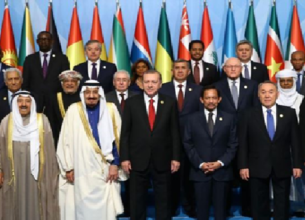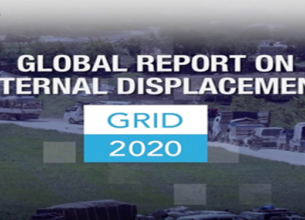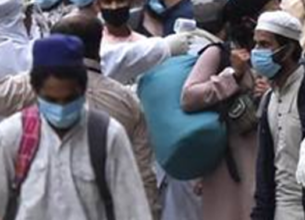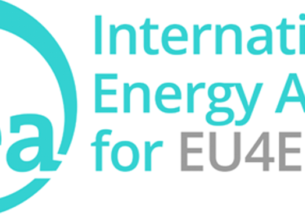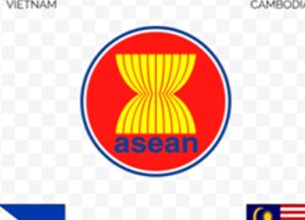OIC ASKS INDIA TO REVOKE ITS ACTIONS IN KASHMIR
27, Sep 2019

Prelims level : International Institutions – Summits, Working, Organisations
Mains level : GS-II- Bilateral, Regional and Global Groupings and Agreements Involving India and/or affecting India’s interests.
Context:
- The Organisation of Islamic Cooperation (OIC) asked India to “rescind” its actions in Kashmir and abide by the relevant UN Security Council resolutions following New Delhi’s decision to revoke Jammu and Kashmir’s special status.
Details:
- The Foreign Ministers of the Organisation of Islamic Cooperation (OIC) Contact Group on Kashmir discussed the Indian government’s decision to revoke Article 370 in Jammu and Kashmir and the state’s bifurcation into two Union Territories during a meeting on the sidelines of the 74th session of UN General Assembly.
- It also said India should allow access to Jammu and Kashmir to human rights organisations and international media to ascertain and report on the situation there.
Organisation of Islamic Cooperation (OIC)?
- The Organisation of Islamic Cooperation (OIC) is the second largest inter-governmental organisation after the United Nations, with the membership of 57 states, covering four continents.The OIC is the collective voice of the Muslim world to ensure and safeguard their interest on economic socio and political areas.
- The OIC has Institutions, which implement its programmes. Its Headquarters is in Jeddah, Kingdom of Saudi Arabia.
- The OIC’s mission statement bills it as “the collective voice of the Muslim world” that works to “protect the interests of the Muslim world”. It was established by 24 member states in 1969.
Islamic Summit:
- The Islamic Summit includes Kings, Heads of State and the Governments of Member States, and is the OIC’s supreme authority.
- It convenes once every three years to deliberate, take policy decisions, provide guidance on issues pertaining to the realization of objectives and consider other issues of concern to Member States and the Ummah.
Council of Foreign Ministers (CFM)
- The Council of Foreign Ministers meets once a year and considers the means for the implementation of the OIC’s general policy by adopting decisions and resolutions on matters of common interest in the implementation of the OIC’s objectives and general policy, and reviewing progress in the implementation of decisions and resolutions adopted at previous Islamic Summits and Councils of Foreign Ministers. The CFM considers and approves the programme.
Why Was the OIC Established?
- The OIC first met in Morocco in September 1969, a month after an arson attack inside the Al-Aqsa Mosque that destroyed part of the roof and the 800-year-old pulpit of Salahuddin, best known for recapturing Jerusalem from the Crusaders in the 12th century.
- Reacting to the incident, representatives from 24 Muslim countries met in the capital Rabat to establish a body that would promote cooperation across the Muslim world.
- In March 1970, the first Islamic Conference of Foreign Ministers was held in Jeddah, Saudi Arabia, and plans for setting up a permanent secretariat for the OIC were established.
- Issues relating to Palestine have been central to the OIC’s agenda and summit discussions. The organisation has continuously condemned what member states consider Israeli aggressions against the Palestinians.
- Other issues that have also taken centre stage in OIC summits include the wars in Bosnia and Iraq, a rise in the number of refugees from Muslim-majority countries such as Syria, as well as Islamophobia in the West.
Objectives and Role:
- According to its charter, the OIC aims to preserve Islamic values, safeguard and defend the national sovereignty and independence of member states and to contribute to international peace and security.
- While the organisation has been known for its cultural and social projects, its political influence has been relatively limited.
- “Typically, in the past, the OIC has been effective in promoting cultural and educational projects across the Muslim world,”. “However, its political capabilities remain severely limited.”
- The OIC has relative political weight, its rhetoric does not always translate into action on the ground.
- “With 57 member states… the OIC carries a [relatively] heavy political weight… [and] impact. But how much change that makes on the ground is not always clear,”.
- Adding to its political limitations is its inability to unify its stance on issues, say experts.
- “Like other international organisations, such as the UN General Assembly, the OIC is supposed to have a unified voice but it does not because policies of the individual countries greatly differ,”
- “Most importantly, the OIC doesn’t have a unified voice because most of its member countries are not democracies. So, while their populations may be in agreement [over an issue] they do not always represent the views of their populations.”
Members of OIC:
- Today, with 57 member states from four continents, the OIC is the second-largest intergovernmental organisation in the world after the United Nations, with a collective population reaching over 1.8 billion.
- The majority of its member states are Muslim-majority countries, while others have significant Muslim populations, including several African and South American countries.
- While the 22 members of the Arab League are also part of the OIC, the organisation has several significant non-Arab member states, including Turkey, Iran and Pakistan.
- It also has five observer members, including Russia and Thailand.
- The organisation has permanent delegations to the UN and the European Union and its official languages are Arabic, English and French.
Is the OIC relevant and effective?
- Like other intergovernmental organisations, although resolutions issued by the OIC are not usually followed by action, statements usually point towards member states’ “red lines” that they cannot cross.
- Because the OIC includes a significant number of Arab states among its membership, it has often been compared with the Arab League.
- While the two organisations share many similarities, the main difference lies in the OIC’s limited politicisation compared with the Arab League.
- “The Arab League is more of a political entity than the OIC given the close proximity of its members and the, often joint, threat that the countries have had to face in the past,”



